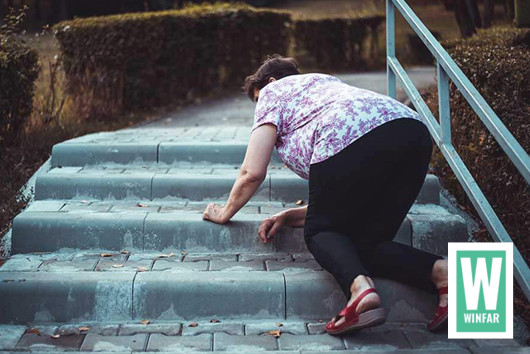Falls are a serious matter for older adults. Not to be underplayed or understated. Even if you’re pretty sure your loved one just tripped and stumbled, a good evaluation can uncover issues – so it’s best to treat any fall as a warning sign.
Older adults who have fallen are at higher risk of a future fall. So, if you want to reduce the risk of falls in the future, be proactive after the first incident, and ensure you get the right kind of medical assessment after any fall.
A fall can be a sign of an underlying issue or medical problem that needs attention.
For example, an older person could be weakened and fall because of dehydration, or an untreated urinary tract infection.
And Be proactive about asking your doctor questions. Most doctors have the best intentions, but not a lot of time. So be politely proactive, and make sure that certain things aren’t overlooked – especially those factors that could have contributed to the fall
In this post, Dr Leslie Kernisan shares 8 things you need to ensure your doctor checks after an older adult experiences a fall.
This will help you make sure your loved one has had a thorough work-up, and can reduce the chance of future serious falls.
8 things the doctors should check after a fall
1. An assessment for underlying new illnesses
Doctors should always check for underlying new illnesses when an older person experiences generalized weakness, delirium, or other signs of feeling unwell. Just about any new health problem that makes an older person weak can bring on a fall.
So, be attentive and bring up any symptoms you’ve noticed, and let the doctor know how quickly the changes came on.
Some common underlying ailments to look out for include:
– Urinary tract infection
– Dehydration
– Anemia (low red blood cell count), which can be brought on by bleeding in the bowel or by other causes
– Pneumonia
– Heart problems such as atrial fibrillation
– Strokes, including mini-strokes that don’t cause weakness on one side
2. Request a blood pressure and pulse reading when sitting, and when standing
This is especially important if you’ve been worried about falls – or near falls – that are associated with light-headedness, or fainting.
If your older person takes blood pressure medication, make sure the doctor confirms that he or she isn’t experiencing a drop in blood pressure with standing.
A 2009 study of Medicare patients coming to the emergency room after fainting found that checking sitting and standing blood pressure was the most useful test. However, it was only done by doctors 1/3 of the time.
3. Blood tests
Doing blood tests after a fall is always a good idea.
Falls can be worsened by problems with an older person’s blood count, or by things like blood sodium getting too high or too low.
Generally, a complete blood cell count (CBC) is a good place to start – and a check of electrolytes and kidney function (metabolic panel, or “chem-7″)
Be sure to ask the doctor to explain any abnormalities found in the blood work, whether they might be related to falls, and how the doctor plans to address them.
If your loved one has diabetes and takes insulin or other medications to lower blood sugar, be sure to bring in the glucometer or a blood sugar log. Episodes of low blood sugar (hypoglycemia) are an important risk factor for falls, but a laboratory blood test generally doesn’t show moments of low blood sugar.
4. Medications review
Many older adults take medications that increase fall risk, without knowing it!
These medications can often be reduced, or even eliminated, so be sure to ask the doctor to address the following types of medications:
- Any sedatives, tranquilizers, or sleeping medications.
Common examples include zolpidem (Ambien) for sleep, or lorazepam (Ativan) for anxiety.
Antipsychotic medications for restless dementia behaviors, such as risperidone or quetiapine, can also increase sedation and fall risk. - Blood pressure and diabetes medications.
As noted above, it’s not unusual for older adults to be “over-treated” for these conditions, meaning they are taking a level of medication that causes the blood pressure (or blood sugar) to be lower than is really necessary for ideal health. - “Anticholinergic” medications.
These medications are commonly taken by older adults, who often have no idea that these medications worsen balance !
They include medications for allergies, overactive bladder, vertigo, nausea, and certain types of antidepressants which may also be given for nerve pain. For a good list of anticholinergics, click here. - Opiate pain medications
5. Gait and balance
At a minimum, a gait assessment means that the doctor carefully watches the way the older person is walking.
And does some simple balance checks.
If gait and balance don’t seem completely fine, consider teh following:
- Many older people adjust their gait in reaction to pain in their feet, joints, or back – so have that conversation, and ask them directly if they are experiencing any pain or discomfort, that could cause a problem.
- Consider a physical therapy visit to asses gait and balance.
A physical therapist can often recommend suitable strengthening exercises, and possibly recommend an assistive device (e.g. a walker) if appropriate. - Vitamin D levels
If your loved one spends a lot of time indoors, doesn’t take vitamin D supplements, and hasn’t been checked for low vitamin D, ask the doctor to consider this test.
6. Evaluation for underlying heart conditions or neurological conditions
These chronic conditions are different from the “acute” types of illnesses that we usually look for right after a fall.
In a minority of cases, an older person may be falling because he or she has developed a chronic problem with their heart or blood pressure system. An example of this would be paroxysmal rapid atrial fibrillation, which sometimes causes the heart to race,
It’s also possible for older people to develop a new chronic neurological condition, such as Parkinson’s disease.
If you’re worried about these possibilities, ask the doctor
“Do you think a heart condition might have caused this fall?
Or do you think an underlying neurological condition could have caused this fall?”
It’s particularly useful for you to ask about these kinds of problems if the falls or near-falls keep happening, especially if you’ve already minimized risky medications and over-treatment of high blood pressure.
7. Vision, podiatry, and home safety referrals
Could your loved one be in need of a vision check, podiatry care, or a home safety evaluation?
If you’ve brought an older person in after a fall, it’s a good idea to talk to the doctor about whether these services might help.
Vision checks are always an excellent idea if the older person hasn’t had one recently.
How to use this information
Print out this post and take it along with you the next time you take an older person to see the doctor after a fall.
If the doctor overlooks certain points, don’t be shy, ask the questions.
Always rather err on the side of caution than overlook something, and regret it later.
DISCLAIMER: This website does not provide medical advice. This information, including text, graphics, images, and other material contained on this website is for information purposes only. No material on this site is intended to be a substitute for professional medical advice, diagnosis, or treatment. Always seek the advice of your physician or other qualified health care provider with any questions you may have regarding a medical condition or treatment before undertaking a new health regime, and never disregard professional medical advice or delay in seeking it because of something you have read on this website.
Sources:
betterhealthwhileaging.net/8-things-to-check-after-fall-in-aging/
homecareassistancewinnipeg.ca/what-to-have-a-doctor-check-after-an-older-loved-one-falls/
www.ccwh-living.com/country-club-blog/checklist-for-visiting-the-doctor-after-a-senior-falls/
dailycaring.com/8-things-doctor-check-after-aging-person-falls/
www.caringseniorservice.com/blog/essential-medical-evaluations-after-a-fall

